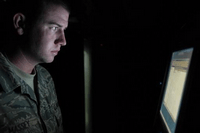During the U.S. presidential election, the Republican National Committee made headlines with a campaign flyer it mailed out to voters in Missouri and Virginia. A photo on the front showed a plane with its nose pressed against the exterior of an airport terminal, presumably filled with travelers. The text, beside a picture of the Democratic nominee on the inside, read, "Barack Obama thinks terrorists just need a good talking to." The flyer was meant to be provocative in its partisan assessment of an Obama presidency. Equally intriguing, however, was what it reflected about the way Americans still think of terrorism. Namely, as something that happens aboard planes. Americans are nervous when flying the skies and rarely think twice when turning on their computers. But a major new report says cyberterrorism presents a significant danger to U.S. national security. Worse yet, it found that the country is woefully unprepared to meet the threat. The 44-page report, "Securing Cyberspace in the 44th Presidency," is the work of the U.S. Commission on Cybersecurity (USCC). Made up of executives, high-ranking military and intelligence officials, and two members of Congress, the commission found that the threat from cyberterrorism is so dire that President-elect Obama must move quickly to meet it, by creating a center for Cybersecurity Operations and appointing a special White House adviser to oversee it.
The Threat of Cyberterrorism

